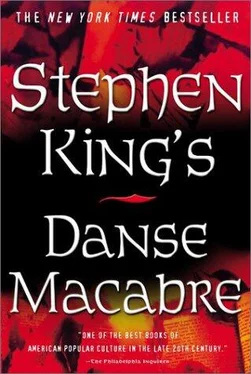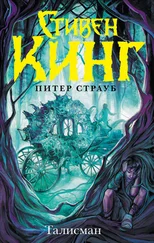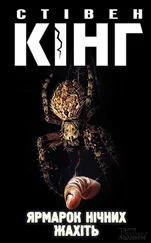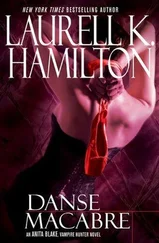But below all of this, hidden by the moral conventions of the horror tale (but perhaps not all that hidden), the face of the real Werewolf can be dimly seen. Much of the compulsion I felt while writing The Stand obviously came from envisioning an entire entrenched societal process destroyed at a stroke. I felt a bit like Alexander, lifting his sword over the Gordian knot and growling, " Fuck untying it; I've got a better way." And I felt a bit the way Johnny Rotten sounds at the beginning of that classic and electrifying Sex Pistols song, "Anarchy for the U.K." He utters a low, throaty chuckle that might have come from Randall Flagg's own throat and then intones, "Right . . . NOW !" we hear that voice, and our reaction is one of intense relief. The worst is now known; we are in the hands of an authentic madman.
In this frame of mind, the destruction of THE WORLD AS WE KNOW IT became an actual relief. No more Ronald McDonald! No more Gong Show or Soap on TV-just soothing snow!
No more terrorists! No more bullshit .' Only the Gordian knot unwinding there in the dust. I am suggesting that below the writer of the moral horror tale (whose feet, like those of Henry Jekyll, are "always treading the upward path") there lies another creature altogether. He lives, let us say, down there on Jack Finney's third level, arid he is a capering nihilist who, to extend the Jekyll-Hyde metaphor, is not content to tread over the tender bones of one screaming little girl but in this case feels it necessary to do the funky chicken over the whole world. Yes, folks, in The Stand I got a chance to scrub the whole human race, and it was fun !
So where is morality now?
Well, I'll give you my idea. I think it lies where it has always lain: in the hearts and minds of men and women of good will. In the case of the writer, this may mean beginning with a nihilistic premise and gradually relearning old lessons of human values and human conduct. In the case of The Stand , this meant beginning with the glum premise that the human race carries a kind of germ with it-I began by seeing this germ symbolically visualized in the SLA, and ended by seeing it visualized in the superflu germ-which grows more and more virulent as technology grows in power. The superflu is unleashed by a single technological misstep (not such a far-fetched presumption, either, when you consider what happened at Three Mile Island last year or the fact that Loring AFB in my own state scrambled bombers and fighters ready to head over the pole toward Russia as the result of an amusing little computer foulup which suggested that the Russians had launched their missiles and the Big Hot One was on). By simple agreement with myself to allow a few survivors-no survivors, no story, am I right?-I was able to envision a world in which all the nuclear stockpiles would simply rust away and some kind of normal moral, political, and ecological balance would return to the mad universe we call home.
But I don't think anyone knows what they really think-or perhaps even what they really know-until it's written down, and I came to realize that the survivors would be very likely to first take up all the old quarrels and then all the old weapons. Worse, all those deadly toys would be available to them, and things might well become a sprint to see which group of loonies could figure out how to launch them first. My own lesson in writing The Stand was that cutting the Gordian Knot simply destroys the riddle instead of solving it, and the book's last line is an admission that the riddle still remains.
The book also tries to celebrate brighter aspects of our lives: simple human courage, friendship, and love in a world which so often seems mostly loveless. In spite of its apocalyptic theme, The Stand is mostly a hopeful book that echoes Albert Camus's remark that "happiness, too, is inevitable.” More prosaically, my mother used to tell my brother David and I to "hope for the best and expect the worst," and that expresses the book I remember writing as well as anything.
So, in short, we hope for a fourth level (a triple Werewolf?), one that will bring us full circle again to the horror writer not just as writer but as human being, mortal man or woman, just another passenger in the boat, another pilgrim on the way to whatever there is. And we hope that if he sees another pilgrim fall down that he will write about it-but not before he or she has helped the fallen one of his or her feet, brushed off his or her clothes, and seen if he or she is all right, and able to go on. If such behavior is to be, it cannot be as a result of an intellectual moral stance; it is because there is such a thing as love, merely a practical fact, a practical force in human affairs.
Morality is, after all, a codification of those things which the heart understands to be true and those things which the heart understands to be the demands of a life lived among others . . . civilization, in a word. And if we remove the label "horror story" or "fantasy genre" or whatever, and replace it with "literature" or more simply still, "fiction," we may realize more easily that no such blanket accusations of immorality can be made. If we say that morality proceeds simply from a good heart-which has little to do with ridiculous posturings and happily-ever-afterings-and immorality proceeds from a lack of care, from shoddy observation, and from the prostitution of drama or melodrama for some sort of gain, monetary or otherwise, then we may realize that we have arrived at a critical stance which is both workable and humane. Fiction is the truth inside the lie, and in the tale of horror as in any other tale, the same rule applies now as when Aristophanes told his horror tale of the frogs: morality is telling the truth as your heart knows it. When asked if he was not ashamed of the rawness and sordidness of his turnof-the-century novel McTeague , Frank Norris replied: "Why should I be? I did not lie. I did not truckle. I told them the truth.” Seen in that light, I think the horror tale may more often be adjudged innocent than guilty.
17
My, look at this . . . I do believe the sun is coming up. We have danced the night away, like lovers in some old MGM musical. But now the band has packed their melodies back inside their cases and has quitted the stage. The dancers have left, all but you and I, and I suppose we must go, as well. I cannot tell you how much I've enjoyed the evening, and if you sometimes found me a clumsy partner (or if I occasionally stepped on your toes), I do apologize. I feel as I suppose all lovers feel when the dance has finally ended, tired . . . but still gay.
As I walk you to the door, may I tell you one more thing? We'll stand here in the vestibule as they unroll the rug again and douse the lights. Let me help you with your coat; I'll not keep you long.
Questions of morality in the pursuit of horror may be begging the actual question. The Russians have a phrase, "the scream of the woodcock." The phrase is derisory because the woodcock is nature's ventriloquist, and if you fire your shotgun at tile place where the sound came from, you'll go hungry. Shoot the woodcock, not the scream, the Russians say.
So let's see if we can't find a woodcock-just one-in all these screaming thickets. It might just be hiding in this item, truth rather than fiction, from The Book of Lists , the Wallace/
Wallechinsky clan's attic full of fascinating rickrack and useful junk. As you get ready to leave, think about this . . . or brood upon it: THE MYSTERY OF LITTLE MISS NOBODY On July 6, 1944, the Ringling Brothers and Barnum & Bailey circus was giving a performance in Hartford, Connecticut, before 7,000 paid customers. A fire broke out; 168
persons died in the blaze and 487 were injured. One of the dead, a small girl thought to be six years old, was unidentified. Since no one cattle to claim her, and since her face was unmarred, a photograph was taken of her and distributed locally and then throughout the U.S. Days passed, weeks and months passed, but no relative, no playmate, no one in the nation came forward to identify her. She remains unknown to this day.
Читать дальше










